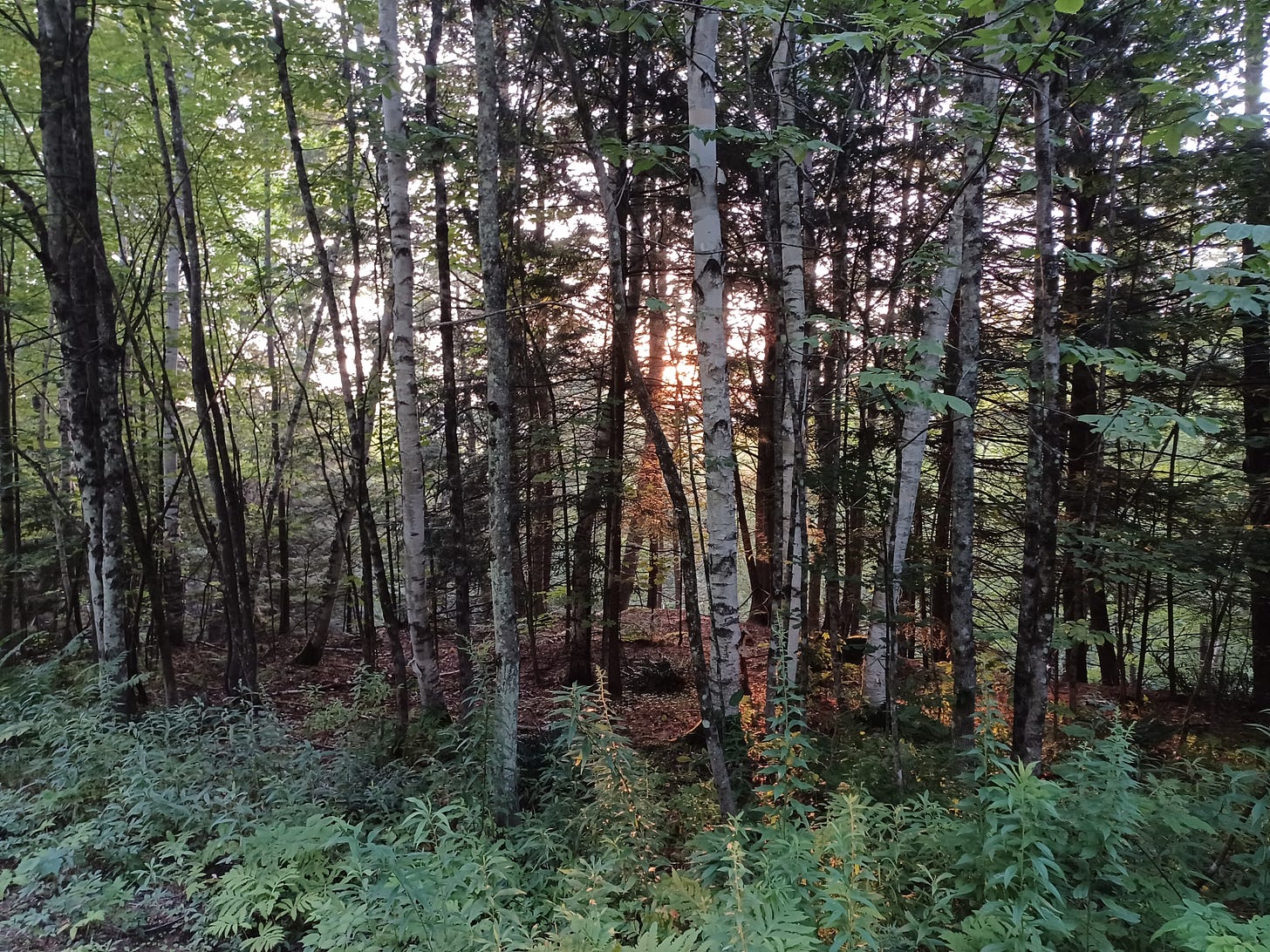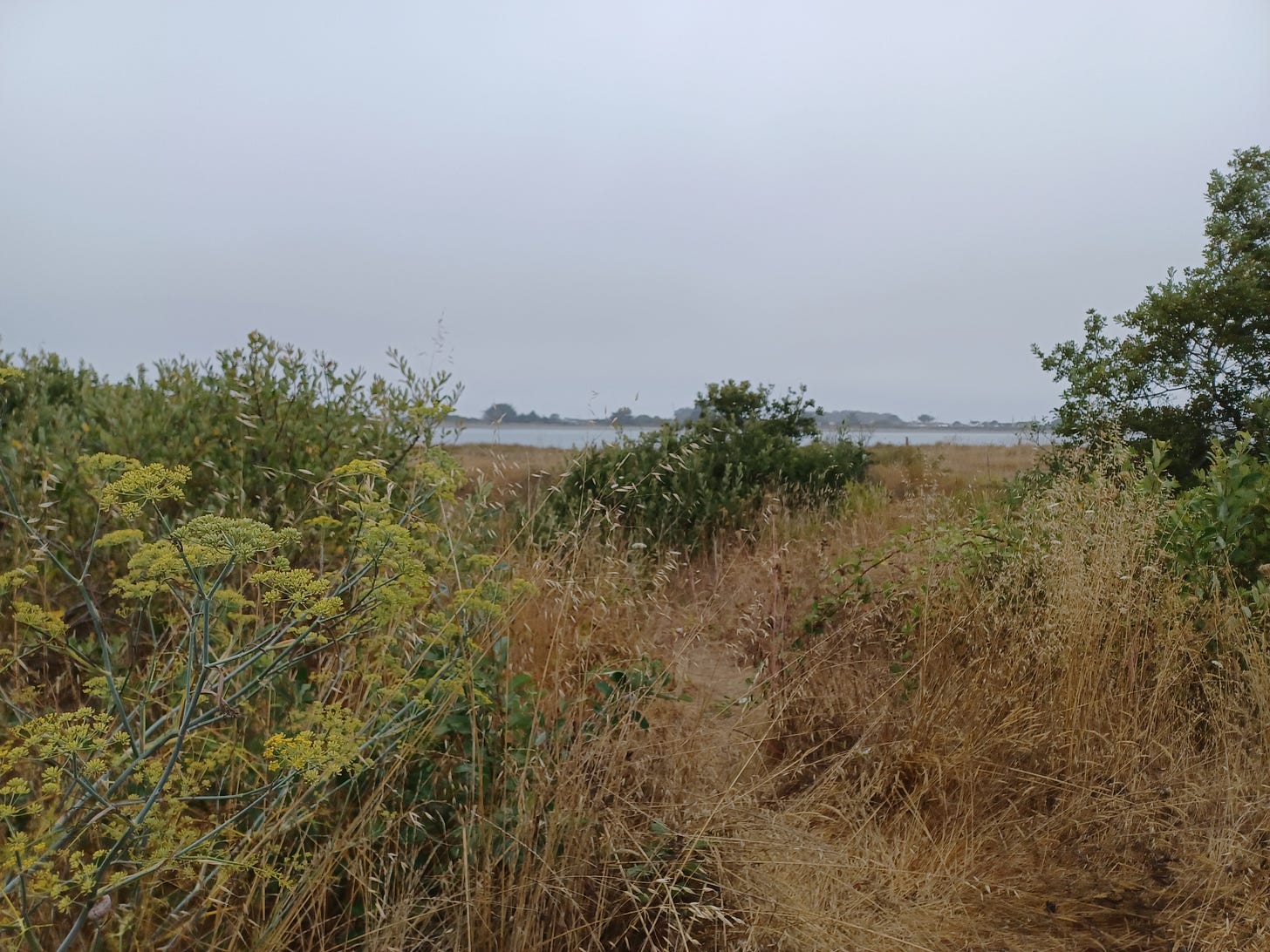Behind You From Three Hours Ahead
Aspiration arises across scary terrain from California disaster's ashes.
On one flank of society’s future, code chews itself to churn out bigger code, after a time outfoxing humans. On the other, humans crowd into creaky cities or spread out on crumbly hilltops, and everywhere fire and flood consume our wood and metal. What path should humans chart between these perils, and how? How can we be sure we’re making informed choices?
One answer sprouts from an experiment underway in California.
So far in this Substack log, I’ve invited you to inspect practicing patience, engaging with strangers out loud, and treating complex things as complex. I’ve suggested that experiencing nature can catalyze those habits. I offer that those habits can build skills we’ll all need as the climate changes. These include making new paths, translating others’ emotional speech in our heads, negotiating while holding core values, and using the Internet without letting its titans use us. I’ve suggested that working together fosters all these skills.
Now, I’ll put these ideas into the fire. First: I’m not suggesting that everyone spend weeks in a cabin or by the shore. I wish everyone could. Dipping into nature is holy and holistically useful, but only spartans and swells can do it at length, and only the very spartan or very swell can do it full-time. Everybody else needs a roof, which means everybody else needs insurance.
So fly with me to California, where climate-driven loss has charred its way into scars. An experiment suggests that experts can retool the tricks that have always brought them prestige, if they come together under certain conditions.
In Southern California, neighborhoods up in flames became Exhibit 54312 testifying that climate chaos has infused daily life. As happened in my hometown after Superstorm Sandy, some public and private leaders are using the fire-scarred land as a cue for new capitalist designs.
On his America Adapts podcast, which I follow the way 1940s folks might have followed Murrow from London, host Doug Parsons spoke to two entrepreneurs about the Resilient LA Delta Fund. That’s a pool of capital, still growing, whose managers aim to use it to help people make their homes safer from future fires - and thus more feasible to insure (and own, and use, and stuff like that).
Operative here runs an idea that reverses financial flows. For the 20th Century, insurance pools of capital waited for nature or error to lay waste to things that grew out of invested capital: houses, factories, cars, reputations. Now, disaster pervades the air we breathe. It could seep or explode any time from the membrane that separates built things from nature. So, insurance shouldn’t wait. It should patch vulnerable places. (For disclosure, I have talked to the Delta Fund’s co-coordinators, the Resiliency Company, about doing paid writing for them. I have also done writing for another organization that worked with Insurance for Good, the fund’s other partner.)
You could spread this idea beyond disaster’s stages. In a society constantly and everywhere quivering to survive infernos and tsunamis, anything that’s flowing more predictably releases more energy for everyone else to expend on entrepreneurship, creativity, and romance. On that logic, imagine two cities. One sits by the water and the other glares down at it. A city with enough green space and jobs and clean affordable homes is more resilient, even with waves lapping at it, than one with yawning wealth gaps on a parapet. In the one on the cliff, civil war could begin.
And with that in mind, consider what I just learned further north in California, in a city called Eureka. (Now, I learned not much, but enough to want to learn more.)
It started as Bucksport, became a mill town, and after the mill closed I can’t tell much what happened except that the mill site became the Bayshore Mall. Now the city’s built out a generous waterfront path, with signs every so often showing what used to go on at the mill and what now goes on in the wetlands. One sign says the city chose a bike chain shaped like the native banana slug as its logo, to celebrate resilience.
Maybe civic enterprise like this warrants its own financial protection. You could imagine a system that pools capital against the risk of community dissolution, worsening homelessness, or isolation. As the Delta Fund supports thorough preemption against fire, another fund could support preemption against civic decay.
The knotty work comes in determining which sorts of projects and programs warrant investment. It seems tempting, for a freelance writer with no capital at risk, to let sentiment drive that sort of decision-making. A city that tries hard should get protection, you muse. But in the shadow of 350-year-old trees taller than Willis Tower, decisions deserve more care and time.
Eureka seems effortful. Its bike trail and Friday night block parties made me root for it. It’s tempting to imagine a pool of housing insurance that people in a city can take from rental to rental or that developers can use to backstop affordable homes. Or insurance for public works like the bike path, which can create floodable space as well as programming to encourage sociable behavior.
You might want to insure nature itself, as rural and coastal construction remain popular despite the risks. Funds could promote best practices in building with respect for ecosystems and weather - and could nourish respect among people.
We’ll see how preemptive work in insurance evolves and how the race to process more data might help neighborhoods preserve more comity. It’s worth remembering that neighbors who know each other by face can face disaster more surely.



